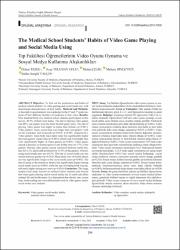| dc.contributor.author | Tezol, Özlem | |
| dc.contributor.author | Tolunay Oflu, Ayşe | |
| dc.contributor.author | Çelik, Melda | |
| dc.contributor.author | Dinleyici, Meltem | |
| dc.contributor.author | Yalçın, Sıdıka Songül | |
| dc.date.accessioned | 2022-07-01T09:22:33Z | |
| dc.date.available | 2022-07-01T09:22:33Z | |
| dc.date.issued | 2020 | en_US |
| dc.identifier.citation | Alışkanlıkları, S. M. K. (2020). The medical school students’ habits of video game playing and social media using. Turkiye Klinikleri J Health Sci, 5(2), 288-97. | en_US |
| dc.identifier.issn | 2536-4391 | |
| dc.identifier.uri | https://doi.org/10.5336/healthsci.2019-70532 | |
| dc.identifier.uri | https://hdl.handle.net/20.500.12933/1287 | |
| dc.description.abstract | Objective: To find out the preferences and habits of medical school students’ in video gaming and social media use, with determinant characteristics of their habits. Material and Methods: A descriptive questionnaire was conducted to the 4rd and 5th grade students of four different faculties of medicine in four cities. Results: Nine hundred thirty-two medical school students participated in this survey, 46.5% of them were males. The rate of playing video games was 60%, war games were the most favorite game types. The rate of playing video games was higher in males than females (p<0.001). Video gamers’ mean screen time was longer than non-gamers’ both on the weekdays and weekends (p=0.015; p<0.001, respectively). Video gamers’ mean body mass index value was significantly higher than non-gamers’ mean value (p<0.001), obesity and overweight rates were significantly higher in video gamers (p<0.001). Video games caused a decrease in lecture/sports event/ hobby time for 37% of the gamers. Playing video games caused confusion between reality-fantasy for 4.3%, and health problems for 13.9% of the gamers. Overall, using social media rate was 89.5%. The rate of social media use was similar between genders (p=0.283). Mean daily time of mobile phone use was significantly longer in the social media users (p<0.001). The rate of going to the cinema or theatre was significantly higher among social media users (p=0.003), while the rate of reading book was significantly higher among non-users (p=0.024). Conclusion: This large sample sized study focused on medical school students and showed that video game playing and/or social media use in youth can affect cultural life and health status. It is determined that obesity rate, screen time, book reading rate were affected adversely in video gamer and/or social media user students. | en_US |
| dc.description.abstract | Amaç: Tıp fakültesi öğrencilerinin video oyunu oynama ve sosyal medya kullanma alışkanlıkları ile bu alışkanlıkları belirleyici özelliklerin araştırılmasıdır. Gereç ve Yöntemler: Dört şehirde 4 farklı tıp fakültesinde öğrenim gören 4. ve 5. sınıf öğrencilere tanımlayıcı anket uygulandı. Bulgular: Çalışmaya katılan 932 öğrencinin %46,5’ini erkekler oluşturdu. Öğrencilerin %60’ının video oyunu oynadığı, en çok tercih edilen oyun türünün savaş oyunları olduğu görüldü. Erkeklerde oyun oynama oranı kızlara göre daha yüksek bulundu (p<0,001). Video oyunu oynayanların ortalama ekran süresinin, hem hafta içi hem hafta sonu günlerde daha uzun olduğu saptandı (p=0,015; p<0,001). Video oyunu oynayanların ortalama beden kitle indeksi değerinin oynamayanların ortalama değerinden daha yüksek olduğu (p<0,001), video oyunu oynayanlarda obezite ve fazla kiloluk oranının daha yüksek olduğu belirlendi (p<0,001). Video oyunu oynayanların %37'sinde video oyunlarının ders/spor/hobi zamanlarında azalmaya sebep olduğu belirlendi. Video oyunu oynamanın oyuncuların %4,3’ünde gerçek-fantazi ayrımında karışıklığa, %13,9’unda sağlık sorunlarına yol açtığı tespit edildi. Katılımcıların %89,5’inin sosyal medya kullandığı, sosyal medya kullanım oranının cinsiyetler arasında benzer olduğu görüldü (p=0,283). Sosyal medya kullanıcılarında günlük cep telefonu kullanma süresinin daha uzun olduğu saptandı (p=0,003). Sosyal medya kullananlarda sinemaya/tiyatroya gitme oranı daha yüksek bulundu (p=0,003), kullanmayanlarda kitap okuma oranı daha yüksek (p=0,024) bulundu. Sonuç: Bu geniş örneklemli çalışma tıp fakültesi öğrencilerine odaklandı ve video oyunu oynamanın ve/veya sosyal medya kullanmanın, gençlerde kültürel hayata ve sağlık durumuna etki edebileceğini gösterdi. Video oyunu oynayan ve/veya sosyal medya kullanan öğrencilerde obezite oranının, ekran süresinin, kitap okuma oranının olumsuz etkilendiği belirlendi. | en_US |
| dc.language.iso | eng | en_US |
| dc.publisher | Türkiye Klinikleri | en_US |
| dc.relation.isversionof | 10.5336/healthsci.2019-70532 | en_US |
| dc.rights | info:eu-repo/semantics/openAccess | en_US |
| dc.subject | Video games | en_US |
| dc.subject | Social media | en_US |
| dc.subject | Habits | en_US |
| dc.subject | Medical school students | en_US |
| dc.subject | Video oyunları | en_US |
| dc.subject | Sosyal medya | en_US |
| dc.subject | Alışkanlık | en_US |
| dc.subject | Tıp öğrencileri | en_US |
| dc.title | The Medical School Students’ Habits of Video Game Playing and Social Media Using | en_US |
| dc.title.alternative | Tıp Fakültesi Öğrencilerinin Video Oyunu Oynama ve Sosyal Medya Kullanma Alışkanlıkları | en_US |
| dc.type | article | en_US |
| dc.authorid | 0000-0002-5389-2220 | en_US |
| dc.department | AFSÜ, Tıp Fakültesi, Dahili Tıp Bilimleri Bölümü, Çocuk Sağlığı ve Hastalıkları Ana Bilim Dalı | en_US |
| dc.contributor.institutionauthor | Tolunay Oflu, Ayşe | |
| dc.identifier.volume | 5 | en_US |
| dc.identifier.issue | 2 | en_US |
| dc.identifier.startpage | 288 | en_US |
| dc.identifier.endpage | 297 | en_US |
| dc.relation.journal | Türkiye Klinikleri Sağlık Bilimleri Dergisi | en_US |
| dc.relation.publicationcategory | Makale - Ulusal Hakemli Dergi - Kurum Öğretim Elemanı | en_US |
















